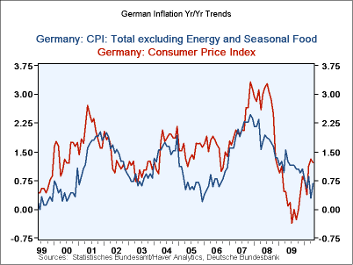 Global| Jun 11 2010
Global| Jun 11 2010German Inflation Perks Up; Core Rate In Mild Rebound From Lows
Summary
The German harmonized inflation rate rose by 01% in May, Germany's domestic headline inflation measure fell by 0.1% with the core up at a sharp +0.5% offsetting last month's 0.4% drop. Headline inflation in Germany is steadily [...]
The German harmonized inflation rate rose by 01% in May, Germany's domestic headline inflation measure fell by 0.1% with the core up at a sharp +0.5% offsetting last month's 0.4% drop.
Headline inflation in Germany is steadily increasing with the annualized rate climbing over shortening time spans at 1.2% over 12-mos, 1.3%over 6-mos and 2.6% over 12-mos. Core inflation is still tempered at a 1.5% three-month pace in May. But it is not showing clear acceleration as the 1.5% standing is higher than both the Yr/Yr and the six-month pace but the six month pace shows deceleration from 12-months. On balance there are some core pressures but they are not as steady building as for headline inflation.
How widespread is inflation's acceleration? Using the main 11 categories in the table inflation is accelerating over three-months compared to six months in 63% of the categories. It' acceleration over six months compared to 12-months is only in only 36% of the categories. It is accelerating Yr/Yr compared to the pace of one year ago in 54% of the categories. On balance there is evidence of inflation and it is most acute over three-months where the measurement is the least reliable and most volatile. Apart from the 3-month diagnostic, inflation's acceleration does not seem that sharp or widespread.
One key for the ECB is going to be how to deal with oil that has been booming and busting and wreaking havoc with price trends and with inflation more generally. A second key will be to see how it deals with all the financial distress in the region. There is not only financial distress but national austerity plans in train. With all of these negative growth shocks we would expect the ECB to be a bit more inflation-tolerant than it might be in other times. But that is still a question for the policymakers. After all, stimulus is being breathed into the euro-economy by the ever weakening currency. And with that comes some added inflation threat to counter the downside growth risks. What will the ECB do? That is what we will be watching to see. I expect temperance but I am ever wary.
Robert Brusca
AuthorMore in Author Profile »Robert A. Brusca is Chief Economist of Fact and Opinion Economics, a consulting firm he founded in Manhattan. He has been an economist on Wall Street for over 25 years. He has visited central banking and large institutional clients in over 30 countries in his career as an economist. Mr. Brusca was a Divisional Research Chief at the Federal Reserve Bank of NY (Chief of the International Financial markets Division), a Fed Watcher at Irving Trust and Chief Economist at Nikko Securities International. He is widely quoted and appears in various media. Mr. Brusca holds an MA and Ph.D. in economics from Michigan State University and a BA in Economics from the University of Michigan. His research pursues his strong interests in non aligned policy economics as well as international economics. FAO Economics’ research targets investors to assist them in making better investment decisions in stocks, bonds and in a variety of international assets. The company does not manage money and has no conflicts in giving economic advice.
More Economy in Brief
 Global| Feb 05 2026
Global| Feb 05 2026Charts of the Week: Balanced Policy, Resilient Data and AI Narratives
by:Andrew Cates







